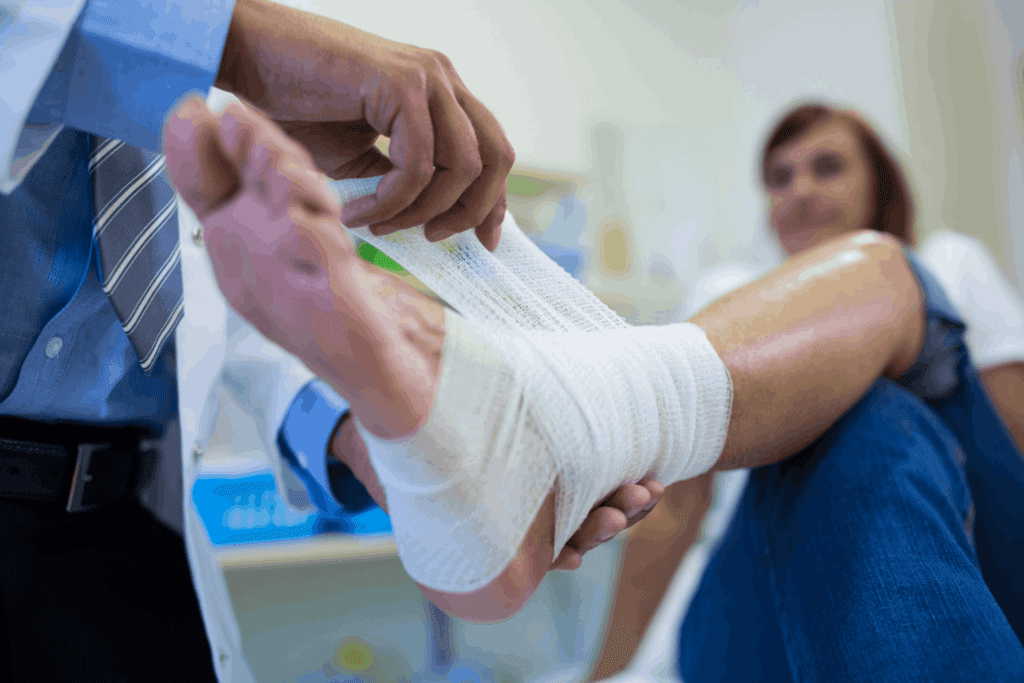According to the National Safety Council (NSC), crashes involving cars and other motor vehicles totaled 13,204,000 in 2021. These collisions caused 5,400,000 injuries and 46,980 fatalities in the US. Globally, crash injuries are also one of the leading causes of death for all age groups.
The human body isn’t designed to withstand the impact of a motor vehicle accident. Hence, it’s typical for victims to suffer from an injury and experience pain. Injury-related pain symptoms may manifest right after a car rash. But other times, they may take days or weeks to develop.
Understanding the different types of pain after a car accident and knowing how to respond appropriately is essential to protect one’s overall health. It will help you seek appropriate medical treatment to prevent complications for potential car accident injuries.
Suppose you get hurt in an auto accident because of someone else’s negligence. A personal injury attorney can guide you through securing proper compensation for the pain and injury you sustained. You can also visit The Personal Injury Center for legal articles that will help you understand your personal injury case.
Key Takeaways
|
What are the different types of pain after a car accident?
Pain may arise from various injuries. Recognizing the type of pain you’re dealing with can help you spot and address any possible injury you sustained from the crash. However, most pain can radiate to many areas, such as your neck, back, head, and other body parts. You may also likely feel sore everywhere, making it challenging to identify what type of pain you’re experiencing.
Getting examined by a doctor is necessary to ensure proper diagnosis and treatment. But knowing the following types of pain after a car accident and their potential indications is a good starting point.
Neck pain
Neck pain is a typical car accident injury symptom, even in fender benders. The impact of the collision abruptly thrusts your head sideways or in a forward and backward motion.
These sudden movements can cause severe stress and strain on the neck, especially if you are wearing a seat belt. Moreover, the human body’s natural response when anticipating a collision is to tense up muscles. This can increase the risk of neck strain and damage to the ligaments, muscles, and tendons. The pain may manifest as stiffness and limited range of motion, making it painful to move your neck.
Neck pain due to whiplash or soft tissue injuries may subside within six weeks to a month, depending on the extent of your injury. Other common injuries associated with neck pain after a car accident include pinched nerves and herniated discs.
Pain that worsens and goes untreated can become a serious injury. Hence, ensure to get examined by a doctor, particularly if you experience nausea, vomiting, or neck pain.
Medical professionals can examine tissue damage using advanced tests like X-rays and computed tomography (CT) scans. These tests can confirm the presence of a neck injury.
Back pain
The force of impact in a car accident may also exert immense pressure on the spine. But back pain may not manifest immediately after the car crash.
You must remain alert for any physical discomfort and unusual sensations. A thorough medical exam is also crucial to properly diagnose and treat upper or lower back pain after a car accident. Untreated cases may lead to chronic pain, permanent nerve damage, and a lifetime of disability.
Most back pain gradually heals with conservative treatment options, such as medications, physical therapy, and injections. But severe back pain associated with spinal cord injuries may require surgery to relieve pressure on the spine or the surrounding nerves.
Other symptoms to watch out for when experiencing back pain after a car accident are fever, difficulty breathing, numbness in the extremities, paralysis, and blood in the urine. These symptoms may signal a severe back injury, prompting immediate medical attention.
Head pain
The trauma of being involved in a car accident may also cause head pain. Neck pain that radiates to the head may lead to headaches. Regardless of the underlying causes, you must seek medical attention for any instances of head pain following an auto accident.
Persistent headaches after a car crash may indicate a head injury. Additional symptoms may include ear ringing, soreness in the neck region, emotional disturbances, and vision problems.
Head injuries or traumatic brain injuries (TBI) may be as mild as bruises or as severe as fractured skull bones or internal bleeding to the brain. More serious injuries may lead to prolonged unconsciousness, coma, or death.
Ensure to obtain a complete medical evaluation and appropriate diagnosis for your head pain to determine the cause of your symptoms.
Shoulder pain
Shoulder pain resulting from an auto accident can stem from a simple sprain or strain from the impact force. Since your shoulders are connected to your neck and back, they’re likely to absorb the crash force in minor or severe collisions.
Depending on the initial injury, shoulder pain may result in unusual cognitive changes, such as memory loss, dizziness, and headaches. Whiplash, soft tissue damages, broken bones, and dislocation are some injuries commonly linked to shoulder pain.
It’s important not to wait for visible signs before seeking medical attention for your shoulder pain. A medical professional can examine the shoulder joint using medical diagnostic imaging techniques to pinpoint the exact location of your injury.
Chest pain
Chest pain following a car accident is a common symptom of serious injuries, such as fractured ribs, internal bleeding, and punctured lungs. Although they are crucial safety features, seatbelts, and airbags can restrain and hit the body during an accident, causing various chest injuries.
Undergoing diagnostic tests is a great way to determine if you have sustained an injury to your chest. However, you must receive emergency care if you experience shortness of breath, loss of consciousness, dizziness, and chest pain.
How To Deal With Delayed Pain After a Car Accident


The body releases a sudden surge of adrenaline and endorphins to react quickly in stressful and traumatic situations like car crashes. As a result, pain after a car accident may be delayed by days or even weeks.
This natural reaction can significantly increase the body’s pain threshold, reducing your perception of pain sensations. This phenomenon explains why some accident victims may not feel pain or realize the severity of their injuries immediately.
When left undetected and untreated, the cause of delayed pain can result in life-threatening complications and permanent impairment. Delayed pain after a car accident can also affect your injury claim.
Taking the following steps can help protect your health and ensure compensation for the delayed injuries and pain you may sustain from the crash.
Obtain timely medical care
Proving your injuries were a direct result of the accident is one of the essential elements of claiming financial compensation. Unfortunately, pain and other injury symptoms after a car accident don’t manifest immediately. As a result, some may forego immediate medical attention.
Subsequently, after symptoms manifest, it may become too late to seek medical care and effectively fight for your case. Most
Obtaining timely medical care in an emergency room or hospital provides a record of your injury and its link to the accident in question. Physical evidence of doctor visits and medical treatment will place you in a more advantageous position to recover compensation for your delayed pain and injury.
Follow the recommended treatment plan
The recovery process for car accident injuries can be frustrating and time-consuming. It’s one of the reasons many patients ignore or skip doctor’s recommendations.
But failing to comply with the recommended treatment plan can jeopardize your health and personal injury claim. It may worsen your pain and lead to long-term complications. Moreover, the
As a result, you will either receive reduced compensation or be forced to pay the expenses on your own. To prevent that, adhere to follow-up appointments and undergo other treatments your physician prescribes.
Document your injury-pain-related symptoms
Maintaining an accident journal where you can document and describe your injury-pain-related symptoms is a good idea. Besides recording symptoms, you can rate the level of pain you’re experiencing.
Describe each injured body part and how it prevented you from performing your daily activities. This documentation can help you demonstrate the limitations and diminished quality of life resulting from delayed pain and injury.
Seek compensation with a lawyer’s assistance
A lawyer’s assistance is invaluable when seeking appropriate compensation for your delayed pain. Lawyers possess the skills to accurately estimate your current and future financial costs, as well as intangible losses.
An experienced attorney is well-versed in the laws governing claims for delayed pain after a car accident. They can gather and preserve evidence to strengthen your claim and prove the at-fault driver’s liability.
Additionally,
Types of Compensation Available for Your Pain After a Car Accident


All motorists have a legal obligation to exercise reasonable care when driving. Unfortunately, many drivers are negligent and fail to comply with traffic regulations.
Suppose an accident occurs due to speeding, tailgating, and other negligent driving behaviors and gets you injured. The at-fault driver who caused the accident is liable for compensating you for monetary and subjective losses.
With the help of a car accident attorney, you may be entitled to recover different types of compensation in your car accident claim.
Medical expenses
Treatment options for car accident injuries may vary, depending on their nature and severity. Some injuries may only need pain medications, while more severe injuries require surgical interventions.
Costs associated with medical treatment and hospitalization can quickly accumulate. Fortunately, the medical expenses you incurred due to the car accident and your injury are compensable as economic damages.
Suppose you need continuous physical therapy and chiropractic care to manage chronic pain. You can add these to your future medical bills and obtain monetary compensation.
Loss of wages
The pain you experience after a car accident may force you to miss work while recuperating and getting treatment. You can recover the amount of income you lost during this time.
Loss of wages is another type of economic damage you can obtain after the crash. It aims to cover the money you would have earned if you hadn’t been injured in the accident.
If the injuries you sustained result in permanent disability, you may be unable to return to work. As it affects your ability to earn money indefinitely into the future, you can pursue damages for lost earning capacity.
Pain and suffering
Pain and suffering pertain to the discomfort and emotional trauma resulting from the physical injury sustained in the crash. The compensation you can collect for pain and suffering depends on how the injuries diminish your quality of life and limit your daily activities.
Pain and suffering are compensable as non-economic damages. This type of damage isn’t quantifiable solely by medical bills and receipts. Consequently, it can be difficult to prove pain and suffering and calculate its monetary value.
Testimonies from medical professionals are beneficial in substantiating your claim for pain and suffering. Other compensable non-economic damages in your injury claim may include loss of enjoyment of life, scarring, disfigurement, and loss of consortium.
Wrongful death damages
When an auto accident results in the death of a family member, you may obtain monetary compensation for wrongful death.
No sum of money can fill the void of losing a loved one. But getting compensated can help ease the financial burdens that will follow.
Depending on the state, the surviving family members entitled to file a claim for wrongful death are the decedent’s spouse, children, parents, and siblings. Wrongful death damages specifically aim to compensate you for the following losses:
- Funeral and burial costs
- Medical expenses associated with the deceased’s treatment
- Lost income that the deceased victim would have earned
- Pain and suffering resulting from the deceased’s untimely death
Did you know?
According to a 2020 study, a prior injury sustained in a car accident is responsible for 63 percent of persistent low back pain cases.
Dealing With Pain After a Car Accident? Consult an Attorney About Your Rights
Some pain symptoms associated with car accident injuries may take days or weeks to manifest fully. Hence, even if you feel completely fine following an accident, meeting with a medical professional is necessary to protect your health and potential injury claim.
A doctor can conduct tests to identify injuries that may not be immediately apparent. This step will help establish a solid trail of evidence, which will be valuable when pursuing compensation for your injuries. Moreover, it’s in your best interest to consult a car accident attorney about your legal rights and options.
Need help to find a reliable lawyer? You can obtain a free case evaluation at The Personal Injury Center. We’ll connect you with an attorney who has handled similar cases as yours. Contact us today to discuss your legal situation in detail.
Obtain proper compensation for your car accident injury. Find competent legal assistance at The Personal Injury Center.
FAQs on Pain After a Car Accident
How much money can you recover from pain after a car accident?
The amount you can recover from pain after a car accident depends on the severity of your injuries and other specific case circumstances. On average, injured victims may expect to receive between $15,000 and $35,000 or more.
What’s the typical duration of pain after a car accident?
The pain’s duration varies for each person. Minor car accident injuries typically heal within weeks, while more severe injuries take several months or years to recover fully. Moreover, some injuries can result in long-term issues or permanent disability.
When should you hire an attorney for pain after a car accident?
Consulting an attorney immediately after a car accident is advisable. Don't wait for your injuries to heal before seeking legal representation. Waiting too long to hire legal help can negatively affect your ability to gather evidence and lower your chances of negotiating a fair settlement.



